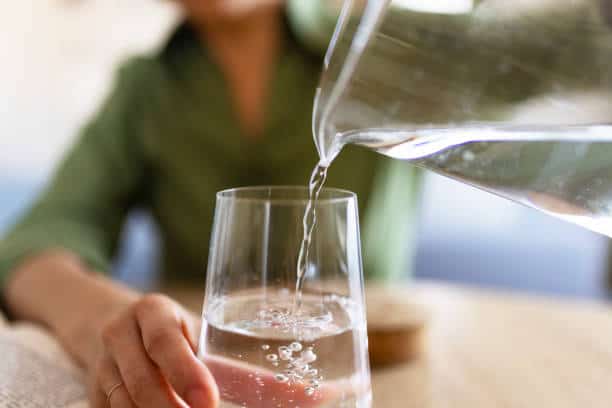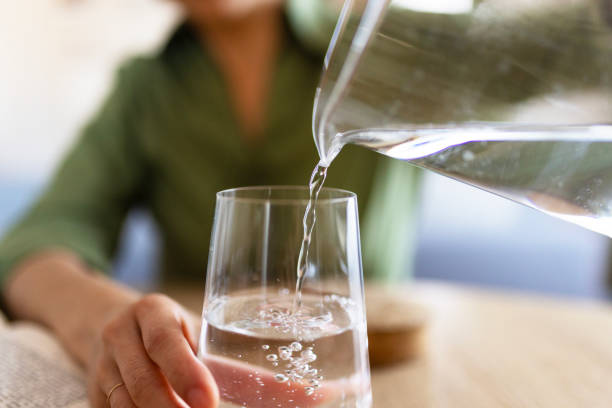
14 Oct The Importance of Hydration for Dental Health During Cooler Months
As the cooler months roll in, our habits and routines often change. We reach for warm drinks like coffee or tea, spend more time indoors, and generally feel less inclined to consume cold water.
While these shifts are natural, they can lead to unintended consequences for our health, particularly regarding hydration and dental care. Hydration plays a critical role in maintaining overall health, and it is especially important for oral hygiene.
During the cooler months, when people tend to drink less water, dehydration can increase the risk of several dental health issues.
This article explores the importance of hydration for dental health, how the cooler months can impact your oral hygiene, and strategies to maintain proper hydration and oral care throughout the season.

Hydration and Oral Health: How They Are Linked
Proper hydration is essential for the production of saliva, which plays a vital role in maintaining oral health. Saliva serves several important functions in the mouth, including:
- Neutralizing Acids: Saliva helps to neutralize acids produced by bacteria in the mouth. These acids can erode tooth enamel, leading to cavities and tooth decay. A well-hydrated mouth ensures that enough saliva is produced to keep these acids in check.
- Washing Away Food Particles: After eating, food particles often remain on and between teeth. Saliva helps to wash these particles away, reducing the chances of plaque buildup and bacterial growth. If your mouth is dry, these food particles may linger, increasing the risk of cavities and gum disease.
- Strengthening Teeth: Saliva contains important minerals like calcium and phosphate, which can help to strengthen tooth enamel and repair minor damage caused by acidic foods or drinks. Hydration is crucial to maintaining the right saliva levels and ensuring these minerals can do their job.
- Preventing Dry Mouth (Xerostomia): Dehydration is a leading cause of dry mouth, also known as xerostomia. This condition makes your mouth feel dry and uncomfortable and reduces your mouth’s natural defense against bacteria, increasing the risk of cavities, bad breath, and gum disease.
How Cooler Months Can Affect Hydration and Dental Health
During the cooler months, people reduce their water intake, either because they feel less thirsty or because they are substituting water with warm, caffeinated beverages like tea, coffee, and hot chocolate.
While these drinks can be comforting, they do not provide the same hydrating benefits as water and, in some cases, may contribute to dehydration.
Several factors contribute to dehydration during colder weather:
- Reduced Thirst Sensation: The body’s thirst mechanism is less active in cooler temperatures. In cold environments, blood vessels constrict to conserve heat, reducing fluid loss through sweat. As a result, people feel less thirsty, even though the body still requires adequate hydration.
- Indoor Heating: As temperatures drop, people spend more time indoors, often with the heat turned on. Indoor heating can reduce humidity levels and dry out the air, leading to moisture loss from the body, including the mouth. This dry air can cause dehydration and exacerbate dry mouth symptoms, putting dental health at risk.
- Caffeine Consumption: During the cooler months, many people consume more caffeinated beverages like coffee, tea, or hot chocolate. Caffeine is a diuretic, meaning it causes the body to lose water through increased urination. This can lead to dehydration and, subsequently, dry mouth.
- Cold-Weather Sports and Activities: For those who enjoy outdoor activities like skiing, snowboarding, or hiking during the cooler months, hydration is often neglected. Cold weather can mask the body’s need for water, and prolonged physical activity without sufficient hydration can lead to dehydration, affecting not just general health but also oral health.
Effects of Dehydration on Oral Health
Dehydration directly impacts oral health, particularly through the reduction of saliva production. When the mouth is dry, it creates an environment where bacteria can thrive, leading to a host of dental problems:
- Increased Risk of Cavities: Without adequate saliva to wash away food particles and neutralize acids, bacteria in the mouth can multiply more easily. These bacteria produce acids that erode tooth enamel, leading to cavities. A dry mouth accelerates this process, making dehydration a significant risk factor for tooth decay.
- Gum Disease: Dehydration and dry mouth can also contribute to the development of gum disease. When there is not enough saliva to clean the mouth, bacteria can accumulate along the gumline, leading to inflammation and infection. Over time, this can develop into gingivitis or, in more severe cases, periodontitis.
- Bad Breath: Dry mouth often leads to bad breath (halitosis). Saliva helps to break down food particles and wash away bacteria that cause odors. When saliva production is reduced, these bacteria can multiply, leading to unpleasant breath.
- Tooth Sensitivity: Dehydration can lead to increased tooth sensitivity. Saliva acts as a buffer, protecting teeth from sudden changes in temperature or acidic foods. Without adequate hydration, the protective effects of saliva are diminished, making teeth more sensitive to hot and cold foods or drinks.
Strategies to Stay Hydrated During Cooler Months
Maintaining proper hydration during cooler months requires a proactive approach, especially since thirst may not be a reliable indicator of your body’s needs. Here are some strategies to ensure you stay hydrated and protect your dental health:
- Drink Water Consistently: Make a habit of drinking water throughout the day, even if you don’t feel thirsty. Keep a water bottle with you and sip from it regularly. Aim for at least eight 8-ounce glasses of water per day, but adjust your intake based on your activity level and environmental conditions.
- Limit Caffeinated and Sugary Beverages: While it’s tempting to indulge in warm beverages like coffee, tea, and hot chocolate, these drinks can contribute to dehydration and affect your oral health. Limit your intake of these beverages, and if you do enjoy them, follow up with a glass of water to rehydrate.
- Opt for Hydrating Foods: Many fruits and vegetables have high water content and can contribute to your daily hydration needs. Incorporate hydrating foods like cucumbers, oranges, apples, and celery into your diet. These foods not only provide hydration but also stimulate saliva production and can help cleanse your teeth naturally.
- Use a Humidifier: If indoor heating is drying out the air in your home, consider using a humidifier to maintain proper moisture levels. A humidifier can help prevent dry mouth and reduce the risk of dehydration, especially overnight while you sleep.
- Stay Mindful of Hydration During Physical Activity: If you engage in outdoor activities like skiing, snowboarding, or hiking, be mindful of your hydration needs. Even though it may be cold outside, your body still loses water through sweat and respiration. Carry a water bottle with you and take breaks to rehydrate.
- Chew Sugar-Free Gum: Chewing sugar-free gum can help stimulate saliva production, which is beneficial for keeping your mouth hydrated. Look for gums that contain xylitol, a natural sweetener that helps prevent cavities.
- Monitor Your Saliva: Pay attention to how your mouth feels. If you notice signs of dry mouth, such as a sticky feeling, difficulty swallowing, or a persistent dry throat, increase your water intake immediately. Staying attuned to these signals can help you catch dehydration early and protect your oral health.

Critical and Necessary
Hydration plays a crucial role in maintaining dental health, and it is essential to stay mindful of your water intake during the cooler months. Reduced thirst, indoor heating, and increased consumption of caffeinated beverages can all contribute to dehydration, leading to dry mouth and a host of oral health problems.
You can protect your teeth and gums throughout the colder season by staying hydrated, limiting sugary and caffeinated drinks, and incorporating hydrating foods into your diet. Remember, healthy hydration habits are essential for your overall health and maintaining a bright and healthy smile year-round.


Sorry, the comment form is closed at this time.